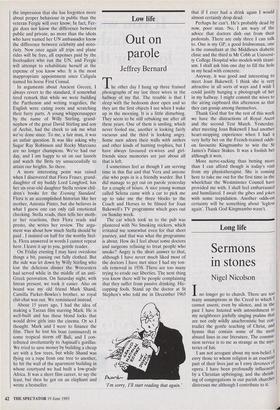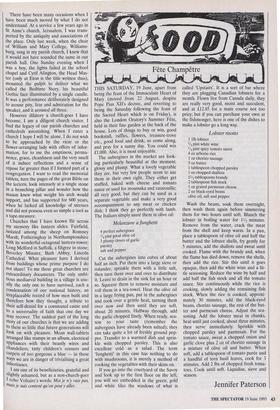Long life
Sermons in stones
Nigel Nicolson
Ino longer go to church. There are too many assumptions in the Creed to which I cannot assent, even by silence, and in the past I have listened with astonishment to my neighbours joyfully singing psalms that are not only wildly anachronistic but con- tradict the gentle teaching of Christ, and hymns that contain some of the most absurd lines in our literature. The commtl- nion service is to me as strange as the mys- teries of Isis.
I am not arrogant about my non-belief. 1 envy those to whom religion is an essential part of their lives just as I envy devotees of opera. I have been profoundly influenced by a Christian upbringing, and the shrink• ing of congregations in our parish churches distresses me although I contribute to it.
There have been many occasions when I have been much moved by what I do not understand. At a service a few years ago in St Anne's church, Jerusalem, I was trans- ported by the antiquity and associations of the place. Only last week, when the choir of William and Mary College, Williams- burg, sang in my parish church, I knew that it would not have sounded the same in our parish hall. One Sunday evening when I was a boy, the lights failed in the school chapel and Cyril Alington, the Head Mas- ter (only at Eton is the title written thus), mounted the pulpit to deliver what we called the Bedtime Story, his beautiful Gothic face illuminated by a single candle. It was a performance deliberately designed to arouse pity, fear and admiration for the speaker, and it aroused all three.
However dilatory a church-goer I have become, I am a diligent church visitor. I find the legacy of our parish churches and cathedrals astonishing. When I enter a church I hope I will be alone. I do not wish to be approached by the vicar or the flower-arranging lady with offers of infor- mation, for to me the emptiness, perma- nence, grace, cleanliness and the very smell of it induce reflections and a sense of repose far greater than if I formed part of a congregation. I want to read the memorial tablets, turn the pages of the great Bible on the lectern, look intensely at a single stone in a branching pillar and wonder how the mason knew what weight his arch would support, and has supported for 600 years, when he lacked all knowledge of stresses and did not possess even so simple a tool as a tape-measure.
Churches that I have known flit across my memory like lantern slides. Fairfield, isolated among the sheep on Romney Marsh; Fotheringhay in Northamptonshire with its wonderful octagonal lantern-tower; Long Melford in Suffolk, a filigree in stone; Beverley Minster, Bath Abbey, Lincoln Cathedral. What pleasure have I derived from buildings whose prime purpose I do not share! To me these great churches are extraordinary documents. The only ambi- tious mediaeval building in a village is usu- ally the only one to have survived, each a Condensation of our national history, an Irreplaceable record of how men built and therefore how they thought, a tribute to their self-denial for a communal cause and to a universality of faith that one day we may recover. The saddest part of the long story of our churches is that we are adding to them so little that future generations will look on with pleasure. Mean wall-tablets arranged like stamps in an album, electrical appliances with their beastly wires and Chandeliers, tatty children's corners and carpets of too gorgeous a blue — in these Ways we are in danger of trivialising a great Inheritance.
I am one of its beneficiaries, grateful and slightly ashamed, but as a non-church-goer I echo Voltaire's words: Mai je n'y vats pas, rnals je suis content qu'on pew' y alter.



















































 Previous page
Previous page